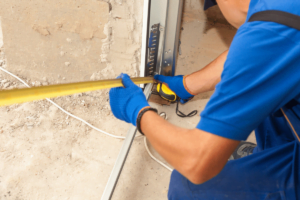Table of Contents
When considering a new garage door or an upgrade, one term you might come across frequently is the “R-Value.” But what does it mean, and why is it important?
Understanding R-Value
In simple terms, the R-Value measures the thermal resistance of a material, specifically its ability to resist heat flow. For garage doors, a higher R-Value indicates better insulation properties. The purpose of insulation, after all, is to reduce energy loss from inside to outside and vice versa. So, if you’re seeking energy efficiency, you’ll want to pay attention to this metric.
Importance of R-Value in Garage Doors
Garages are a significant source of energy loss in many homes. As such, an adequately insulated garage door can contribute to:
- Maintaining a more consistent garage temperature
- Reducing energy bills by preventing heat loss or gain
- Protecting your car and other stored items from extreme temperatures
- Decreasing noise from the outdoors
What Is a Good R-Value for Garage Doors?
This largely depends on your location and specific needs. However, in general:
| Climate | Recommended R-Value |
|---|---|
| Hot & Humid | R-8 to R-11 |
| Cold | R-13 to R-19 |
| Mild | R-6 to R-9 |
Why Choose Us?
At Sooner Garage Doors, we prioritize your needs and provide expert advice to ensure you make informed decisions. Our commitment is reflected in our services and the areas we serve. Our service areas include:
- 24-hour garage door repairs
- Affordable solutions tailored to your budget
- Comprehensive commercial garage door services
- Expert garage door installations
- Essential maintenance checks to prolong your garage door’s life
Frequently Asked Questions
1. How does R-Value differ from U-Value?
The R-Value measures resistance to heat flow, with a higher value being better. In contrast, U-Value measures heat transfer rate, and a lower U-Value indicates better insulating capabilities.
2. Does a higher R-Value also mean better soundproofing?
While a higher R-Value primarily indicates better thermal insulation, it can also provide improved sound insulation. However, for optimum soundproofing, consider other factors like door materials and seals.
3. Can I improve the R-Value of my existing garage door?
Yes, you can add insulation kits or panels to enhance your door’s R-Value. For guidance on this, you might want to explore our post on choosing a new garage door.
4. Does a higher R-Value mean the door will be thicker?
Not necessarily. The R-Value is about the efficiency of the insulating material, not its thickness. Some thinner materials might offer higher R-Values than their thicker counterparts.
Conclusion
Understanding the R-Value of garage doors is pivotal when aiming for energy efficiency. As you’ve seen, a higher R-Value can offer numerous benefits, from reduced energy bills to enhanced comfort. If you’re contemplating a garage door upgrade or require more insights, delve into our garage door repairs FAQ or contact us for expert advice. Let’s ensure you get the most out of your investment.






